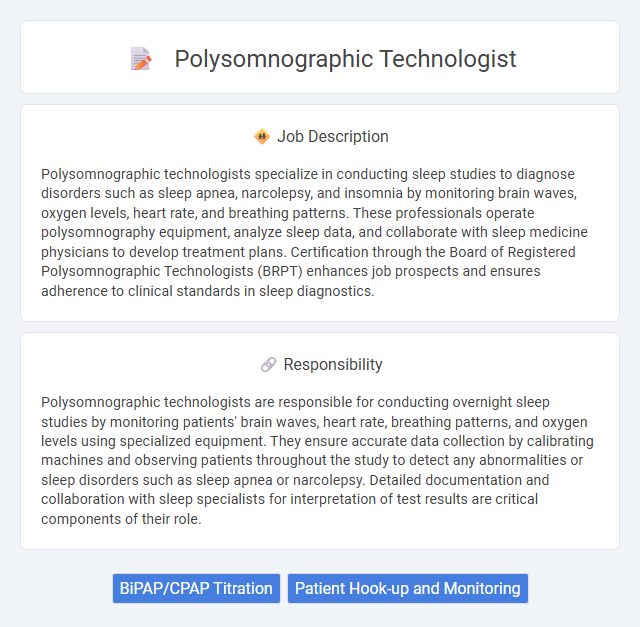
Polysomnographic technologists specialize in conducting sleep studies to diagnose disorders such as sleep apnea, narcolepsy, and insomnia by monitoring brain waves, oxygen levels, heart rate, and breathing patterns. These professionals operate polysomnography equipment, analyze sleep data, and collaborate with sleep medicine physicians to develop treatment plans. Certification through the Board of Registered Polysomnographic Technologists (BRPT) enhances job prospects and ensures adherence to clinical standards in sleep diagnostics.
Individuals with strong attention to detail and an interest in sleep medicine are likely suitable for a Polysomnographic Technologist role, given the requirement to monitor and analyze sleep patterns accurately. People who can remain patient and empathetic toward patients with sleep disorders may find this job fulfilling, as it involves close interaction and support. Candidates prone to high stress or with difficulty maintaining focus during overnight shifts might be less compatible with this profession.
Qualification
Polysomnographic technologists must obtain certification from the Board of Registered Polysomnographic Technologists (BRPT) by passing the Registered Polysomnographic Technologist (RPSGT) exam, which requires completion of an accredited polysomnography program or relevant clinical experience. A background in respiratory therapy, neurodiagnostics, or cardiovascular technology is beneficial, alongside knowledge of sleep disorders and proficiency in using polysomnography equipment. Advanced skills in patient monitoring, data analysis, and compliance with safety protocols are essential for effective sleep study administration and accurate diagnosis.
Responsibility
Polysomnographic technologists are responsible for conducting overnight sleep studies by monitoring patients' brain waves, heart rate, breathing patterns, and oxygen levels using specialized equipment. They ensure accurate data collection by calibrating machines and observing patients throughout the study to detect any abnormalities or sleep disorders such as sleep apnea or narcolepsy. Detailed documentation and collaboration with sleep specialists for interpretation of test results are critical components of their role.
Benefit
Polysomnographic technologists likely experience benefits such as competitive salaries and opportunities for career advancement in the healthcare field. They may gain specialized skills in sleep disorder diagnostics, enhancing their employability in various medical settings. Job stability and the potential for flexible work schedules could also make this career attractive for many individuals.
Challenge
Polysomnographic technologists likely face the challenge of accurately monitoring and interpreting complex sleep data to diagnose various sleep disorders. The role may require adapting to rapidly evolving technology and maintaining patient comfort during overnight testing. Balancing technical precision with compassionate patient care could be a consistent difficulty in this field.
Career Advancement
Polysomnographic technologists can advance their careers by pursuing specialized certifications such as Registered Polysomnographic Technologist (RPSGT) or sleep disorders specialist credentials. Gaining experience in complex sleep studies and mastering advanced diagnostic equipment positions technologists for supervisory roles or sleep lab management. Opportunities also exist in research, education, and sales of sleep-related medical devices, expanding career pathways beyond clinical settings.
Key Terms
BiPAP/CPAP Titration
Polysomnographic technologists specializing in BiPAP/CPAP titration perform overnight sleep studies to monitor and adjust positive airway pressure devices for optimal treatment of obstructive sleep apnea. They analyze respiratory patterns, oxygen levels, and sleep stages using polysomnography equipment to customize BiPAP or CPAP pressure settings, ensuring effective airway patency throughout the sleep cycle. Expertise in data interpretation and patient comfort optimization is essential for successful titration and improving long-term therapeutic outcomes.
Patient Hook-up and Monitoring
Polysomnographic technologists specialize in patient hook-up by accurately attaching electrodes and sensors to monitor sleep patterns, brain activity, oxygen levels, and muscle movements. Skilled in operating advanced polysomnography equipment, they ensure precise data collection critical for diagnosing sleep disorders such as sleep apnea, narcolepsy, and restless legs syndrome. Continuous monitoring during sleep studies allows technologists to detect abnormalities in real time, enabling timely intervention and comprehensive analysis by sleep specialists.
 kuljobs.com
kuljobs.com